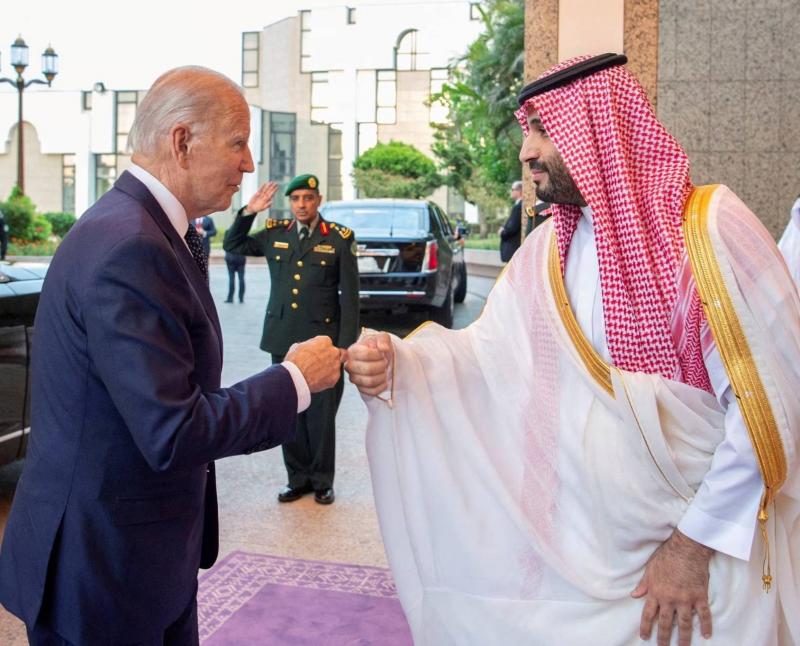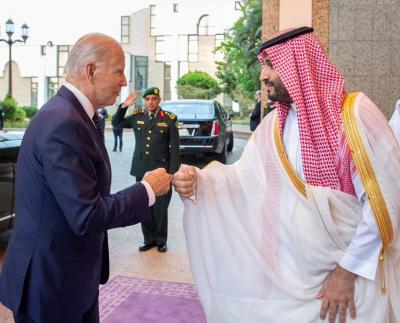Three sources indicated that "Saudi Arabia will be prepared to accept a political commitment from Israel to establish a Palestinian state, instead of any more binding commitments, in an effort to finalize a defense agreement with Washington before the U.S. presidential elections." However, two regional sources said: "Saudi Arabia is increasingly keen on bolstering its security and warding off threats from its rival Iran, so that the Kingdom can move forward with its ambitious plan to transform its economy and attract massive foreign investments."
In October, Riyadh halted U.S.-led diplomatic efforts for months to convince Saudi Arabia to normalize relations with Israel and recognize it for the first time, due to rising Arab anger over the war in Gaza. To create maneuvering room in discussions regarding recognition of Israel and to get the U.S. agreement back on track, two senior regional sources told Reuters that "Saudi officials informed their American counterparts that Riyadh will not insist that Israel take concrete steps to create a Palestinian state, and will accept instead a political commitment to a two-state solution."
Such a significant regional agreement, widely seen as distant even before the outbreak of war between Israel and Hamas, would face numerous political and diplomatic obstacles, particularly the uncertainty regarding the outcome of the conflict in Gaza. An agreement giving the world's largest oil exporter U.S. military protection in exchange for normalization with Israel could reshape the Middle East by bringing two long-standing rivals closer together and linking Riyadh to Washington at a time when China is achieving successes in the region.
The normalization agreement would also bolster Israel's defenses against its arch-rival Iran and provide U.S. President Joe Biden with a diplomatic victory to tout ahead of the presidential elections on November 5. One regional source noted that "Saudi officials have urged Washington in private talks to pressure Israel to end the Gaza war and commit to a 'political horizon' for establishing a Palestinian state," stating that "Riyadh would then normalize relations and help finance the reconstruction of Gaza."
Abdulaziz Al-Saqer, head of the Gulf Research Center in Jeddah and familiar with ongoing discussions, pointed out that "the Kingdom's message to America was: stop the war first, allow humanitarian assistance, and commit to a just and lasting solution to grant Palestinians a state... without that, Saudi Arabia cannot do anything." However, the problem is that Israeli Prime Minister Benjamin Netanyahu, who has spent much of his political life opposing the establishment of a Palestinian state, flatly rejects any American and Arab aspirations to create a Palestinian state once the war in Gaza ends.
A prominent regional source close to Saudi thinking stated, "Normalization requires a genuine commitment from the Israelis that they are open to a two-state solution, if not legally, then at least politically." He added: "If Israel stops its military assault on Gaza—or at least declares a ceasefire—this would make it easier for Saudi Arabia to move forward with the agreement." The Saudi government contact office did not respond to requests for comment.
The Path to Statehood
Riyadh's diplomatic endeavor is driven by the desire to reach an agreement while Democrats hold the White House and the majority in the Senate, alongside increasing concern about Iran's military influence, which has proxies in Saudi Arabia's neighboring Iraq and Yemen, as well as Lebanon, Syria, and Gaza. In the past, many Democratic lawmakers have resisted such agreements and condemned Riyadh for its military involvement in Yemen, its support for oil prices, and its role in the killing of Saudi journalist Jamal Khashoggi in 2018.
Sources familiar with Saudi thinking indicate that with Biden eager to reach an agreement, this may now be the best opportunity for passing the deal in Congress. Regional sources reported that Saudi officials have not clarified exactly what the acceptable "path" to establishing a Palestinian state would be, allowing them room to negotiate an agreement with Israel that does not entail any binding steps. There has also been no attempt to revive the policy that Saudi Arabia has long advocated, which offered Israel normal relations with the entire Arab world in exchange for its withdrawal from territory it occupied in the 1967 war.
However, Al-Saqer from the Gulf Research Center stated that "Riyadh and other Arab diplomats have informed U.S. Secretary of State Antony Blinken and other visiting American officials that without serious and tangible pressure from Washington on Israel, a Palestinian state will not be established." A senior U.S. State Department official noted that "Washington is continuing talks with Riyadh regarding the American-Saudi aspects of the normalization agreement—including nuclear cooperation and security guarantees—but everything hinges on Israel's commitment to the path leading to the establishment of a Palestinian state and ending the war in Gaza."
A White House National Security Council spokesperson, when asked about normalization, stated, "U.S. diplomatic efforts are currently focused on the ongoing crisis." He added: "But we remain committed to the long-term goal of making the Middle East more stable, prosperous, and integrated, including through normalization and pushing toward a two-state solution." Blinken is scheduled to return to the region in a few days.
An unnamed senior Israeli official told Reuters that the "likelihood" of Netanyahu discussing a Palestinian state is "zero... but that does not mean Saudis cannot talk about it, or anyone else." He added, "As Israel has made clear, Palestinians will not have sovereignty in terms of the ability to form an army or enter into treaties with Iran or threaten Israel in any way." Netanyahu stated last month that Israel must retain security control over all territories west of the Jordan River under any future arrangements in the foreseeable future.
Difficult Decisions
An American source noted that "Washington believes Saudi Arabia's strong desire for U.S. defensive guarantees means that the Kingdom would be willing to show some flexibility regarding what could constitute an Israeli commitment to a path leading to the establishment of a Palestinian state." The source added, "One step in this direction might be Netanyahu dropping his opposition to the Palestinian Authority playing a significant role in Gaza after the war."
Establishing relations with the heavyweight Sunni state in the Arab world would be the biggest diplomatic gain for Netanyahu, while for the Palestinians, normalization would revive aspirations for a state of their own with full Arab support. Mohammed Dahlan, former head of Gaza's Preventive Security and a member of Fatah now residing in the UAE, said, "For the first time, I feel there is a strong Arab consensus on the issue of resolving the conflict. And resolving the conflict based on a two-state solution does not mean tactical resolution."
He added: "The question is how serious the Americans and Israelis will be about this, because there is no doubt Israeli seriousness is lacking, but if the Americans are serious on this issue, then in my opinion, this catastrophe that occurred during the war could result in a horizon and hope. The issue is tied to how much the Americans can, let’s say, put the existing issues to stop the war, under reasonable conditions and move seriously towards a political solution, and anything less than that is a waste of time."
The American source stated, "The Biden administration believes Netanyahu is prepared to keep prospects for Israeli-Saudi normalization alive, but he shows no sign of easing his refusal to make concessions to the Palestinians, partly due to the potential destabilization of the far-right ruling coalition." During his trip to the Middle East last month, Blinken used the demand for mapping a path to a Palestinian state—evident during meetings in Turkey, Jordan, Qatar, the UAE, and Saudi Arabia—to present a unified regional stance to Israel.
He told reporters that "Israel will have to make difficult decisions to ensure its long-term security and integration in the region."
As a new three-stage proposal for a ceasefire and the release of hostages in Gaza is under discussion, a cessation of hostilities could provide Saudi Arabia's de facto ruler, Crown Prince Mohammed bin Salman, the opportunity to reach an agreement. A prominent regional source close to Saudi thinking said, "Biden is very eager for the agreement. Saudi Arabia is very eager for the agreement."
He added, "Both sides realize that time is very tight, and they need to finalize it soon, but the Israelis are complicating matters."
Time is Running Out
The source noted that "if Washington responds to Riyadh's demands regarding a defense agreement and assistance with the Saudi nuclear program, and secures an acceptable settlement formula from Netanyahu regarding the establishment of a Palestinian state, the Crown Prince may seize the opportunity."
He added, "There is no doubt that the Gaza War complicated and delayed the process, but Riyadh's main goal is the defense agreement, while anything else, whether normalization with Israel or any other issue, is essentially a means to reach an agreement."
The two regional sources stated that "despite Saudi Arabia and Iran ending their diplomatic rift in a rapprochement brokered by China last year, Riyadh is determined to avoid a repetition of the attacks on its oil facilities on September 14, 2019." Riyadh and Washington accused Tehran of being responsible for the attack, which Iran denied.
Washington and Riyadh agreed to begin discussions regarding a defense agreement and normalization with Israel during Biden's visit to the Kingdom in 2022 to repair strained relations over Khashoggi's killing and the U.S. decision to end military assistance to Riyadh in its war against the Houthis in Yemen. Biden attributed responsibility for the assassination to the Crown Prince, who denied any involvement.
Nonetheless, energy and security interests have compelled Biden and his aides to reset the longstanding U.S.-Saudi strategic partnership that has existed for 80 years, based on a simple equation: U.S. demand for Saudi oil and Saudi demand for American weapons.
However, time may be running out for the two nations to strike a massive deal. The American source stated, "As the U.S. moves further into the presidential election campaign, it becomes more challenging for the Biden administration to gain momentum for any U.S.-Saudi security agreement in Congress."
American officials hope that "linking U.S. defensive guarantees to normalization will help garner congressional support." However, according to some analysts, Netanyahu may prefer to wait for the outcome of the elections, likely to see former President Donald Trump, who had a friendly relationship with both the Israeli leader and the Saudi Crown Prince, as Biden's Republican rival.
Analysts state, "A second Trump presidency, should he win, is widely expected to support normalization between Israel and Saudi Arabia, but it remains unclear what his stance would be on strengthening U.S.-Saudi defense relations."




